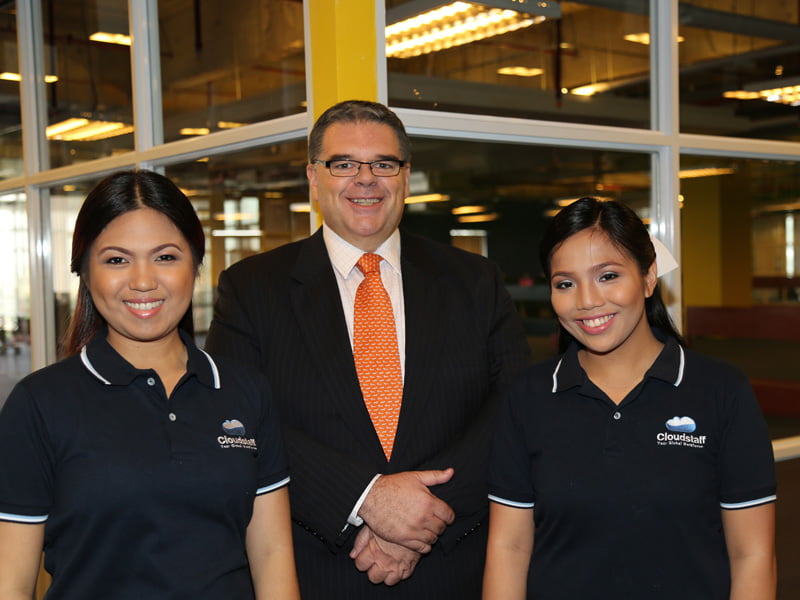More than a decade after cashing out of his dotcom era business WebCentral to Australia’s innovation obsessed Prime Minister Malcolm Turnbull, internet pioneer Lloyd Ernst is on a roll again.
This time, rather than adding server racks in Brisbane, he’s adding staff by the dozen to his technology-driven outsourcing business Cloudstaff in downtown Manila, the capital of the Philippines and in a handful of offices across Southeast Asia’s second most populous nation.
Less than six years after Cloudstaff dipped its toe in the water – from standing start in 2010 offering software quality assurance testing to small and mid-sized Australian businesses – all done offshore – Mr Ernst now presides over a group with 800 staff.

“It really feels like the old dotcom days. Every business was getting on the internet and getting a web site. Now it seems like now every business is looking at building a global workforce,” he told InnovationAus.com.
Prior to launching Cloudstaff, Mr Ernst spent several years trying different iterations of the software development outsourcing business in China amid widespread predictions that China would follow India as the next major global IT services hub.
Add to that, endless rules open to interpretation by layer after layer of bureaucracy at city, provincial and national level as well as the challenges of finding competent, trustworthy local partners.
But it was the lack of any pools of software engineers with a good verbal English and a grasp of western business requirements that proved the deal-breaker, Ernst said
Instead of China, it’s the sprawling archipelago of the Philippines where, uniquely in Southeast Asia, English is an almost universal second language.
Mr Ernst tested the services waters by creating small software QA, testing software development services develop by Australian companies.
“The idea to to try find the bugs in software by testing it on different platforms,” he said.
Now the company offers a range of services including back office and human resources management of Philippines-based IT staff, running 24/7 system monitoring, patching services as well as a growing software development business.
Mr Ernst is squarely targeting his model at Australia’s huge but “unfashionable”, mid-sized business market that are too small to cut the cheques that see major Australia companies such as Telstra, Optus and ANZ set up call centre and IT service centres in the Philippines.
The time and expense of leasing a building and hiring and administering staff, in an unfamiliar culture, and business culture has seen many Australian companies walk away from building an offshore workforce.
“People come along and think I will set up an office in the Philippines, yet it’s complex, expensive and time consuming,” he said. “We can take all of that away.”
But he said Cloudstaff looks after administration and back office processes as well a providing manpower to build systems and software, leaving strategy and the design of systems and software to its customers.
“We don’t manage the projects, that is the intellectual property of our customers, but we mage the process using our own unique software platform.“
For instance, Australian Securities Exchange financial services technology company rubik.com.au has about 60 staff with Cloudstaff inclduing .Net and Java developers.
Mr Ernst said other projects involve involved in getting archived data across to the company’s new IT systems, adding that customers come from abroad range of sectors and it has already inked contracts with groups in the United States,
He said the Philippines is competitive market and providing opportunities for staff is essentially for attracting and retaining high caliber people.
“Of the 800 staff 10-15 per cent are trainees or in training programs, on the Job training. We invest a lot of time in training people, even taking mid and senior developers working on legacy programs,” Mr Ernst said.
“We hire for attitude and train for skills.”
The other big thing we bring to the table is that we have immersion programs with universities
The rise of an increasingly complex services sector in the Philippines as been at the core of its remarkable turnaround from Southeast Asia’ perennial yearly disappointment to fastest growth nation for the past half decade.
“If you are in IT and not growing at 10 per cent a year you are doing something wrong,” said Mr Ernst a figure well in excess of the overall economy of the broader economy.
Like WebCentral, at its core Cloudstaff is a technology company, its own “special sauce” a platform for all its customers needs, able to scale as its customers grow
“We added 80 new staff to engage with customers, unless you have a team of 20 or 30 developers doing your own back-end stuff it’s a generic service,” he added.
There clear admiration for Malcolm Turnbull – his old business partner – and his commitment to the Australian technology sector.
“We have to look at what Australians are really good at and exploit it, rather than copying everyone else. Australians are inquisitive, if there is a problem, let’s go and find a solution,” he said.
Using a flexible lower cost workforce, Mr Ernst believes Cloudstaff is able to help them with the grunt work around the companies own business issues.
Do you know more? Contact James Riley via Email.

